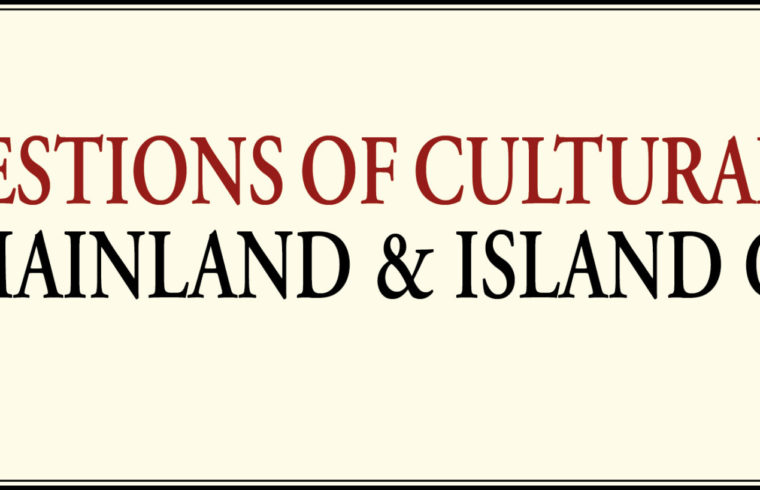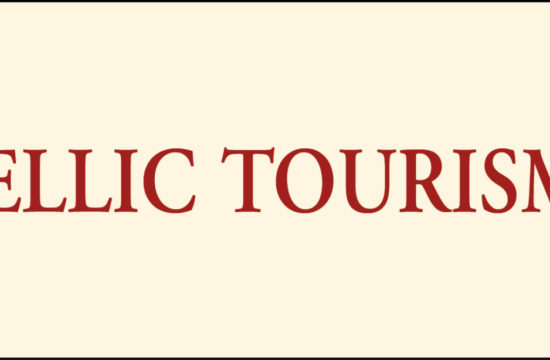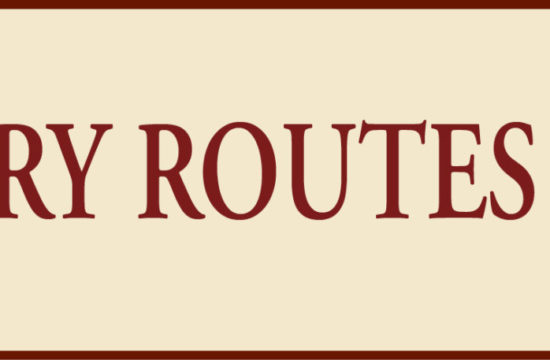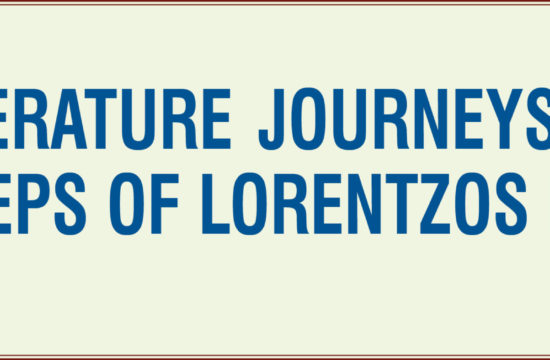- Michopoulou Aikaterini, (toum18670308@uniwa.gr) Under-graduated student from the University of West Attica, Greece
MSc Tourism Business Administration from Hellenic Open University, Greece
- Maniou Fotini, (fvtinimaniou@yahoo.gr). Master of International Studies from the University of Aegean, Greece
Abstract: This review article refers to literary tourism as a special form of cultural tourism. Its purpose is to suggest literary routes and cultural paths in the footsteps of authors and special cultural places. In this paper will be presented two case studies from Mainland and island Greece, where will be proposed routes utilizing the cultural heritage of these areas. The purpose of this paper, is to promote these cultural routes as a tourism product and to enhance their development through alternative and special forms of tourism.
Keywords: Cultural Tourism, Literary Tourism, Literary routes, cultural path, Lesvos, Epidavros
- Introduction
Travels to destinations of cultural interests, can become sources of knowledge, youth and mind expansion (Varvaresos, 2017). Alexandra David-Neel (2007), through her travel experience to Tibet and her contact with the cultural element, makes the connection between travel, youth and spiritual activities, arguing that «Traveling is the same as you study, to sign a long-term contract with the youth». Many voyagers and travellers, who were inspired by the cultural development of each country, transferred this in writing many literary works, such as Nikos Kazantzakis, Lord Byron, Jean Cocteau, Hainrich Harrer, etc. Tourism is characterized as a multidimensional phenomenon, distinguished for its continuous evolutionary course and the impacts, either positive either negative, that it has on society, culture, economy and environment. The development of tourism was based on many factors, the most important were, world peace, international politics, economic prosperity (Tsartas, 1996) and as an activity, requires the contribution of society, culture and environment (Lichorish & Jenkins, 1997).
The development of alternative forms of tourism contributed to the struggle to eliminate negative consequences in the above sectors, as well as to the diversification of the offered tourism product by then and to the configuration of a „new“ one. These new tourism products are characterized by incentives related to culture, natural environment, the element of the sea, gastronomy, sports activities, health, education, etc.
- Cultural Tourism – Greek Reality
One of the oldest and most popular forms of tourism is cultural tourism, where people’s travels are aimed at meeting the human need for diversity, improving the cultural level, experience, knowledge and communication (Moira, 2019). Now days, cultural tourism includes a wider range of culturally related activities, such as history, literature, museums, religion, gastronomy, and other arts. As an alternative form of tourism, isn’t only highlights and utilizes the cultural heritage and all the archaeological, historical and architectural monuments, but also forms the contact frame of the tourist / visitor with the history and the civilization of each place. The proper management of cultural resources, as a result, can have positive impacts on economy and society, through revenue growth, job creations, development of new infrastructure and improvement of existing ones, redistribution of tourism flows in rural and mountainous regions, reduction of seasonality – extension of tourism season, attracting tourists/visitors of high living level and setting new pricing policy.
Greece has always been a destination of high demand, due to the range of its cultural identity that includes, history, antiquities, architecture, theatre, customs, language, literature, sciences, poetry, philosophy, myths, gastronomy, local traditions, human rights, democracy, religion, arts, etc. Despite this wealth, according to a study by the Institute of Greek Tourism Businesses (INSETE, 2018), which concerned the profile of inbound tourism in Greece for the years 2016-2017, 90% of European tourists, had chosen the country for the sun and the sea, while the 35% of non-European countries for 2016 and 41% respectively for 2017 had chosen it for educational reasons through tour-guides. There are many destinations as cultural attractions of visitation, which, of course, can combine cultural tourism with other forms such as gastronomy, sports activities, education, leisure, nature worship, etc., as in the following case studies.
- Case study: Cultural Tourism in Epidavros
Epidavros is a historical region of Peloponnese, in South Greece, where according to mythology is the birthplace of Asklepios, son of god Apollo and the place where the science of medicine was born and in its recent history, was a symbolic place of the Greek War of Independence in 1821. The tour starts from the Ancient Theatre, an archetype of a series of buildings that were constructed in Greece from the end of the 4th century BC., with a capacity of 13,000 to 14,000 spectators and the wider archaeological area. According to Guardian’s report (2020), it is a monument of recovery and inspiration through the beauty and wisdom of the ancients. During the summer months, the Athens-Epidaurus Festival takes place with theatrical and musical performances. The cultural path continues in Ancient Epidavros with the Small Theatre (2,000 seats), the submerged state and the Vaulted Mycenaean tombs, the Castle of Kazarma and the famous Mycenaean Bridge, the monument of the First National Assembly and dozens of chapels of Byzantine and Post-Byzantine ages (Michopoulou, 2020).
Furthermore, Municipality of Epidavros in collaboration with the Hellenic Society of Environment and Culture, aim to the implementation of the program „Culture Trails“, through a series of routes, where visitors can travel in myth and history, through the footsteps of Asclepius, which is still ongoing.
- Epidavros Cultural Path (In Progress)
Sanctuary of Asklepios (Circular) – Ligourio town (Circular) – Ancient Street of Ligourio – Arkadiko village – Mycenaean Route – Foniskos Castle – Ancient Epidavros village – Polemarcha.
According to the results of a primary survey conducted on 28 June till 15 July in 31 local businesses directly or indirectly active in tourism and in local authorities of Municipality, showed that destination is preferred by tourists/visitors due to its reputation (50%), incentives of their preference are sun and sea and participation in Athens-Epidavros Festival, 26% correspondingly. Moreover, Epidavros is a destination for cultural tourism mainly, because the main strengths is archaeological attractions. Furthermore, when the participants were asked about the rate of development of cultural tourism, only 16.6% answered Very much, while the largest percentage 43.3%, answered Moderately. This was related with the fact that 32.2% made distinctive, as Quite Important, the non-exploitable cultural resources as a weakness of the region. A huge percentage around 54%, rated as Very Important the improvement in infrastructure of alternative forms of tourism, for example the implementation of the programme cultural paths (Michopoulou, 2020).
- Case study of Literary Tourism, Lesvos.
As it has been mentioned previously, literature constitutes the puzzle called, civilization, where through the reading of a literary book, can be created a motivation to visit the places where the heroes and the authors lived and acted (Manola, 2019). Literary tourism was also a kind of „pilgrimage“ to these sites and the book was the motivation to visit a tourism literary destination, through descriptions and sometimes, through images (O’Connor & Kim, 2013). The ‘’main lever’’ of literary tourism were also literary-experiential paths, which were emanated from the psychological human need as an emotional being, in order to identify, even for a while, the real world with the imaginary (Manola, 2019).
The development of literary tourism was based on this motivation, with Great Britain as a pioneer country, while alongside ambitious efforts are being made by Greece for the promotion and utilization of its literature, both through literary festivals and the promotion of museum houses. The island of Zante by Dionysios Solomos, Spinalonga by Hislop, My journey to Lhasa by Alexandra David-Neel, Cephalonia island with Captain Corelli’s Mandolin by Louis de Barnieres, Lesvos island from the references and poems of Elytis, Sappho and many others authors, poets and of course, many more such places (Manola, 2020b). Visiting author’s homes, as museums, could be an approach to literature and be supported by any program based on experiential learning. The introduction of a topic and its discussion in the classroom, namely the classical methods of teaching the course of literature, can be enriched through an extended presentation of the topic and this because teaching of the specific course, must match together difficult concepts. A usual rigid detailed project including the cultivation of spirit, character and personality, via the ‘’channel of culture’’ and this regards to a test, that requires respect to all directions, and knowledge (Manola, 2020a).
Lesvos, the former Aeolis of Aristotle, the island that held the grace of Muses in mythology, the inspiration of Elytis’s and Sappho’s poetry, the second home of the uprooted mathematician and physician Benjamin of Lesvos, representative of Modern Greek Enlightenment and the bucolic novel „Daphnis and Chloe“, home of Stratis Myrivilis, Argiris Eftaliotis and the folklore painter Theofilos (Manola, 2019). All the previous components along with the rest cultural such as the global Unesco Geopark with the Museum of Natural History and the Petrified Forest, and the peculiarity of linguistic idioms such as Agiasos, constitute tourism attractions (Manola & Papanis, 2020a).
As in the previous case study, here also, the Council of Europe’s cultural itinerary program could enhance the development of literary tourism, in particular via the route «Lesvos – In Search of Theophilos through Literary Texts». According to the author from Lesvos, Vekri (2019), this proposed route is guided by the «cultural asset», Theophilos and begins as follows:
- Vareia: Theofilos Museum and Elefteriadis Museum-Library Teriade – Mytilini – Moria – Gera: Vrana Museum, Mesagros Bakery – Karyni – Agiasos – Petra: Monastery of Panagia Glykofilousa
Similar suggestions for literary paths could be made ‘’in the steps and places of Myrivilis, Eftaliotis, Elytis, Panselinas combined also, with educational programs for schools (Manola & Papanis, 2020b).
- Conclusion
Cultural Tourism, and especially literary tourism as a new form, constitutes a possible vehicle for variation of the main product of ‘’beach holidays’’, extension of the tourism season and convincing tourists to discover unknown, till know, places of Greece. The great literary wealth of Greece, should not be limited only to the memory, but to aim at the experience of a different tourism experience, using all basic tools for the promotion and development of cultural tourism, such as cultural paths and literary routes. In the race of tourism development, through cultural-literary goods, there should be a cooperation of all stakeholders, concerning the management of culture and tourism, especially in local level, in order to achieve a sustainable relationship between tourism and cultural heritage.
References
Varvaresos, S. (2017), The Lost Art of Travel: from the traveler to the tourist. Athens, Publ. Papazisi.
Vekri, E, (2019), Lesvos, request of Theophilos via Literary Texts. In: Manola, M., ed. Literature, Tourism, Culture. Tsotras Publ., Athens, pp. 227-244.
Lichorish, J. & Jenkins, L. (1997), An introduction to Tourism. 1ST ed. Oxford, Butterworth-Heinemann.
Manola, M. (2019), The worldwide phenomenon of Literary Tourism and its development prospects in Greece. In: Manola, M., ed. Literature, Tourism, Culture. Tsotras Publ., Athens, pp. 11-57.
Manola, M. (2020a), Literary routes in Attica, Experiential Journey to the generation of the ‘30s. Tsotras Publ., Athens
Manola, M. (2020β), Literary Tourism as a phenomenon – Case studies in Greece & Italy.
Available at: web meeting. 27/11.INTEREEG GREECE ITALY.POLYSEMI. https://bit.ly/3746TZT
[Accessed 27 November 2020].
Manola, M. & Papanis, Γ. (2020a), Anthology of the Literary Lesvos of the 20th Century – Educational Practice Suggestions. Tsotras Publ., Athens
Manola, M. & Papanis, G. (2020b), AGIASOS, LESBOS, AN ARCHAIC SOCIETY WITH HOMERIC ORIGINS AND OF A PARTICULAR TOURIST INTEREST. Online-virtual, October 8, 2020, in proceedings of the 4th International Scientific Conference on IT, Tourism, Economics, Management and Agriculture- ITEMA 2020www.itema-conference.com.
Michopoulou, A. (2020), Alternative Forms of Tourism: Municipality of Epidavros, current situation analysis, measures and perspectives of tourism development.
Available at: apothesis.eap.gr/handle/repo/48584
[Accessed 1 December 2020].
Moira, P. (2019), Religious Tourism & Pilgrimage: Policies, Management, Sustainability. Faidimos Publ., Athens.
David-Neel, A. (2007), Magic and mystery in Tibet. Publ. Narkissos, Athens.
O’Connor, N. & Kim, S., 2013. Pictures and prose: exploring the impact of literary and film tourism.
Available at: https://www.tandfonline.com/doi/full/10.1080/14766825.2013.862253
[Accessed 20 November 2020].
Tsartas, P. (1996), Tourists, Travels, Places: Sociological Approaches to Tourism. Exantas Ekdotiki Α.Ε. Athens.
www.sete.gr, 2018. Προφίλ εισερχόμενου τουρισμού για διακοπές στην Ελλάδα, 2016 – 2017.
Available at: https://insete.gr/wp-content/uploads/2020/02/%CE%A0%CF%81%CE%BF%CF%86%CE%AF%CE%BB-%CE%B5%CE%B9%CF%83%CE%B5%CF%81%CF%87%CF%8C%CE%BC%CE%B5%CE%BD%CE%BF%CF%85-%CF%84%CE%BF%CF%85%CF%81%CE%B9%CF%83%CE%BC%CE%BF%CF%8D-%CE%B3%CE%B9%CE%B1-%CE%B4%CE%B9%CE%B1%CE%BA%C
[Accessed 2 December 2020].
www.theguardian.com, 2020. 10 of the best places to revisit after lockdown: readers‘ travel tips.
Available at: theguardian.com/travel/2020/apr/02/10-of-the-best-places-to-revisit-after-lockdown-readers-travel-tips
[Accessed 3 December 2020]









